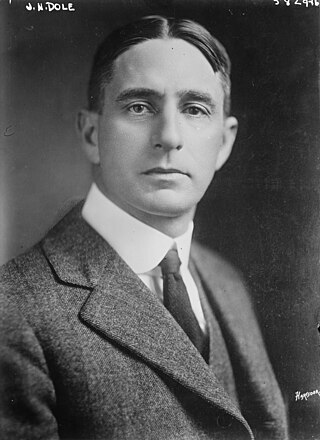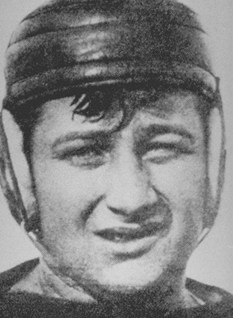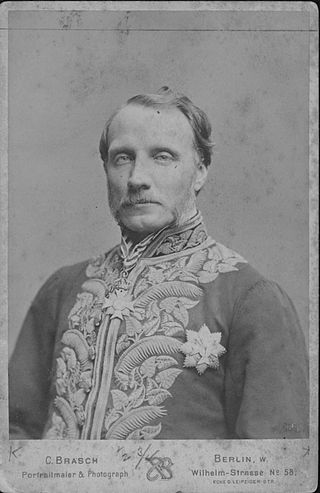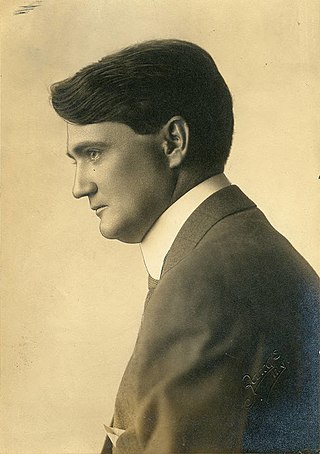Related Research Articles

James Drummond Dole, the "Pineapple King", was an American industrialist who developed the pineapple industry in Hawaii. He established the Hawaiian Pineapple Company (HAPCO) which was later reorganized to become the Dole Food Company that operates in over 90 countries. Dole was a cousin of Sanford B. Dole, President of the Republic of Hawaii.
The Honolulu Star-Bulletin was a daily newspaper based in Honolulu, Hawaii, United States. At the time publication ceased on June 6, 2010, it was the second largest daily newspaper in the state of Hawaiʻi.

William Richards Castle was a lawyer and politician in the Kingdom of Hawaii and Republic of Hawaii.

Harold Roy Ballin was an American football player and coach. He played at the tackle position for Princeton University from 1912 to 1914 and was a consensus first-team All-American in both 1913 and 1914. Ballin served as the head football coach at Duquesne University from 1922 to 1923, compiling a record of 4–12. He was inducted into the College Football Hall of Fame as a player in 1973.

Huntington Reed "Tack" Hardwick was an American football player. He played at the halfback and end positions for Harvard University. He never lost a game during his three years on the varsity, and was selected as a unanimous first-team All-American in 1914. He was elected to the College Football Hall of Fame in 1954. Later in life he co-founded the Boston Garden.

Edward William Mahan was an American football player. While playing halfback for Harvard, Mahan was selected as a first-team All-American three consecutive years from 1913 to 1915. He was widely regarded as one of the greatest football players in the first 50 years of the sport and was named by Jim Thorpe as the greatest football player of all time. In 1951, he was elected to the College Football Hall of Fame as part of the first group of inductees.

Stanley Bagg "Bags" Pennock was an American football player. He was selected as a first-team All-American at the guard position three consecutive years while leading Harvard University to three undefeated seasons from 1912 to 1914. He was killed in 1916 in an explosion at a chemical plant in New Jersey. He was posthumously elected to the College Football Hall of Fame in 1954.

Robert Treat Paine Storer was an American football player for Harvard University. In 1912, he scored Harvard's first touchdown against Yale since 1901 and was selected as a first-team All-American at the tackle position. In 1913, he was captain of Harvard's last undefeated, untied football team until 2001. During World War I, Storer was cited for bravery for his actions in saving a French officer while on a reconnaissance mission.

Amos Starr Cooke was an American educator and businessman in the Kingdom of Hawaii. He was patriarch of a family that influenced Hawaii during the 20th century.

Henry Alpheus Peirce Carter, also known as Henry Augustus Peirce Carter, was an American businessman, politician, and diplomat in the Kingdom of Hawaii.

Alfred Stedman Hartwell was a lawyer and American Civil War soldier, who then had another career as cabinet minister and judge in the Kingdom of Hawaii.

Peter Cushman Jones was a businessman and politician during the Kingdom of Hawaii, Provisional Government of Hawaii, Republic of Hawaii and Territory of Hawaii. He founded the second bank in the Hawaiian Islands.
Henry Homer Hobbs was an American football player and coach. He played college football at Yale University and was selected as a consensus All-American at the tackle position in 1909. He also served as the head coach at Amherst College from 1910 to 1913, compiling a 13–17–2 record with the Lord Jeffs.
The 1915 Harvard Crimson football team represented Harvard University in the 1915 college football season. The Crimson finished with an 8–1 record under eighth-year head coach Percy Haughton. The sole loss was a 10–0 defeat against Cornell. Walter Camp selected three Harvard players as first-team members of his 1915 College Football All-America Team.

William Austin Whiting was an American lawyer and politician of the Kingdom, Republic, and Territory of Hawaii. He served as Attorney General of Hawaii and was an associate justice of the Supreme Court of Hawaii. During his college years, he was captain of the 1875 Harvard Crimson football team.

Joseph Oliver Carter, known professionally as Joseph O. Carter, also known as J. O. Carter and Joe Carter, was a legal advisor to Queen Liliʻuokalani, serving on her Privy Council of State.

Following the January 20, 1891 death of King Kalākaua in San Francisco, his embalmed body arrived at Honolulu Harbor aboard the USS Charleston, draped in black with its ensigns at half mast. His sister Liliʻuokalani was designated his successor.

Joseph Ballard Atherton (1837–1903) was a Honolulu businessman and a former president of Castle & Cooke. He was a member of the Annexation group, which overthrew the Kingdom of Hawaii. He was the founder of Honolulu YMCA. Atherton was a member of both Kalākaua's Privy Council of State and Liliʻuokalani's Privy Council of State.

William Winter Jefferson was an actor in silent films.

Almira Hollander Pitman was an American suffragist and women's rights activist. Pitman was largely active in New England and Massachusetts suffrage organizations. She was also instrumental in working for women's suffrage in Hawaii. Pitman was also known for her writing.
References
- ↑ "High Praise for Atherton Gilman". Honolulu Star Bulletin, November 25. 1913.
- ↑ "Gilman elected Harvard Captain (portrait)". Boston Post, December 11. 1915.
- ↑ "Atherton Gilman Home for Visit". Honolulu Star Bulletin, December 21. 1916.
- ↑ "Gilman elected Harvard Captain (bio)". Boston Post, December 11. 1915.
- 1 2 3 "Harvard Drops Capt. Gilman and Two Other Football Stars Because of Poor Standing". The Evening Times (Pawtucket). 1916-03-08.
- ↑ Lyle Brown (1952-08-04). "Sports Quiz". Fresno Bee Republican.
- ↑ "Gilman Harvard Captain". New York Times, December 11. 1915.
- ↑ "Chosen Crimson Chief: Gilman Elected Captain of Harvard Football Team". The State. 1915-12-11.
- ↑ "Harvard Drops Football Stars, Down in Studies: Capt.-Elect Gilman, Enwright and Boles Must Quit College". Boston Morning Journal. 1916-03-08.
- ↑ "One Name Study".
- ↑ "Joseph A. Gilman Snr".